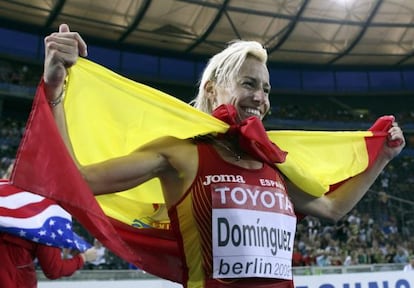Domínguez faces new doping probe
IAAF says athlete’s biological passport proves blood manipulation in 2009

The International Association of Athletics Federations (IAAF) is expected to hand over a case file on Marta Domínguez in the coming weeks to the Spanish track & field authorities, which will have to decide whether to ban the athlete from competition. The IAAF will also announce a provisional suspension for Domínguez, the 2009 world steeplechase champion and double European 5,000m gold medalist.
The IAAF is seeking a two-year ban for the athlete, considered the most successful in Spain’s history, who is also a Popular Party senator. The allegations stem from Domínguez’s biological passport, which has shown anomalies that led analysts to conclude that she has performed blood doping at some stage in her career. An athlete’s biological passport, an initiative launched in 2009 by the IAAF, records all of the blood values of its holder, such as hematocrit, hemoglobin and reticulocyte levels. It was introduced precisely because traditional methods of laboratory anti-doping controls can easily miss anomalies. Through the passport, it is possible to determine a range of minimum levels that can be considered the athlete’s norm. Any levels recorded above or below that range can be considered suspicious.
In Domínguez’s case, according to sources who have seen the report, the hemoglobin level that raised the alarm was recorded in August 2009, coinciding with the Berlin championships. However, those levels were not calibrated until three years later, when compared with far inferior values considered to be the athlete’s norm when she returned to competition after having a baby.
After the initial results, which indicate a 99-percent probability that Domínguez’s increased hemoglobin levels were the result of blood doping, the data was revised by an IAAF expert, who confirmed the recordings, and then passed it on to three independent analysts. The identity of the athlete was not revealed and the experts did not consult during their investigation. They all reached the same conclusion: the 2009 result was anomalous. To be even more certain, the IAAF tested Domínguez again out of competition and sent the samples to the experts. Once more their response was unequivocal: the 2009 results do not fall into the natural range of her blood levels.
Domínguez was also implicated in Spain’s Operation Greyhound doping scandal but was cleared of any wrongdoing. Dutch chemist Douwe de Boer, who is regularly employed by the athlete’s lawyer and who presented evidence in the doping case against cyclist Alberto Contador, claimed in Domínguez’s defense that the proper procedures for testing athletes were not adhered to at the time Domínguez’s blood was taken. The experts dismissed De Boer’s arguments.
Tu suscripción se está usando en otro dispositivo
¿Quieres añadir otro usuario a tu suscripción?
Si continúas leyendo en este dispositivo, no se podrá leer en el otro.
FlechaTu suscripción se está usando en otro dispositivo y solo puedes acceder a EL PAÍS desde un dispositivo a la vez.
Si quieres compartir tu cuenta, cambia tu suscripción a la modalidad Premium, así podrás añadir otro usuario. Cada uno accederá con su propia cuenta de email, lo que os permitirá personalizar vuestra experiencia en EL PAÍS.
¿Tienes una suscripción de empresa? Accede aquí para contratar más cuentas.
En el caso de no saber quién está usando tu cuenta, te recomendamos cambiar tu contraseña aquí.
Si decides continuar compartiendo tu cuenta, este mensaje se mostrará en tu dispositivo y en el de la otra persona que está usando tu cuenta de forma indefinida, afectando a tu experiencia de lectura. Puedes consultar aquí los términos y condiciones de la suscripción digital.









































